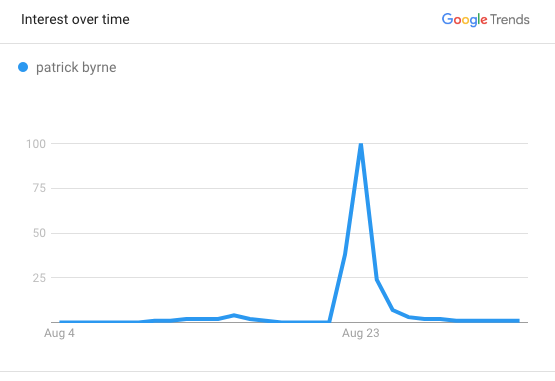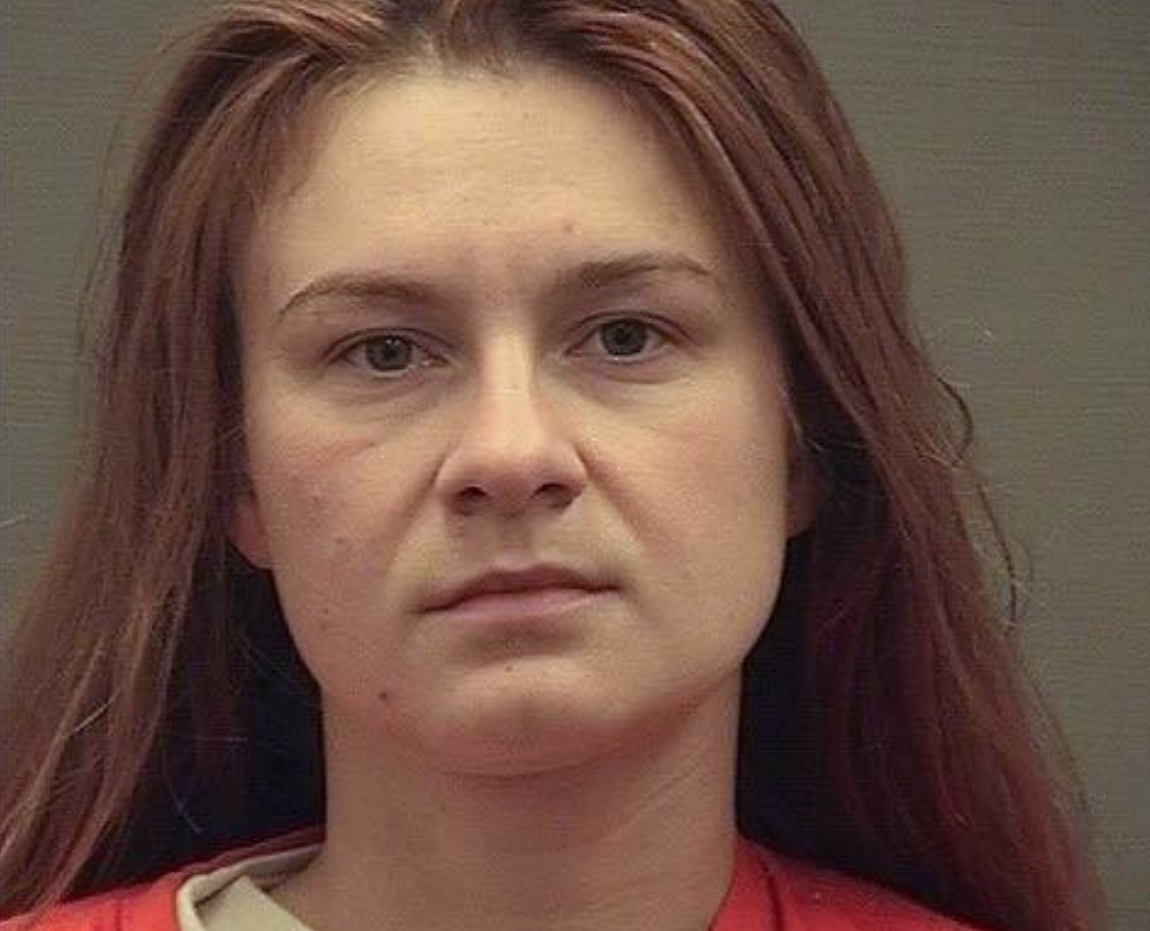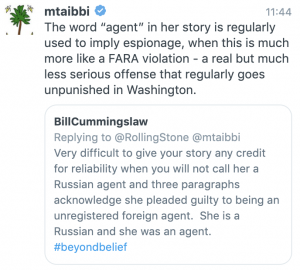Matt Taibbi Attempts to Reinflate Patrick Byrne’s Maria Butina Story
The buzz around Patrick Byrne’s story about having an affair with Maria Butina has almost entirely subsided.
In spite of the fact that folks have moved on, Matt Taibbi, claiming that he’s writing now because Byrne “is taking a beating in the press,” has decided to write up the story.
The tale is now out, and Byrne, whom I’ve known and liked for almost a decade, is taking a beating in the press. It’s unfortunate, and the import of his story is going unnoticed because reporters are focusing instead on Byrne’s eccentricities.
Taibbi reveals that, “Byrne came to me months ago,” which would mean Taibbi was, like Sara Carter, one of the journalists Byrne told about this during the summer, which makes a second journalist who had not covered the Butina prosecution to whom Byrne chose to make claims about the Butina prosecution.
Taibbi explains that he didn’t tell Byrne’s story earlier because he couldn’t confirm it. “Unable to confirm enough of his story, I ended up hesitating.” He also admits that Byrne’s, “hyperbolic storytelling needs to be sorted with care.”
So let’s look at how Taibbi “sorts with care” this story.
He gets one of Byrne’s hyperbolic storytelling references wrong, claiming Byrne used “Men in Black” to refer to the “senior federal law enforcement officials, who encouraged him to pursue a relationship with the Russian.” While Byrne has always said his reasons for using this term would become clear, they never are, but he does explain that the “Men in Black” are actually the line agents who — he’s sure — felt horrible about making the request for him to reengage Butina in July 2016.
I wish to emphasize this: the Men In Black are honorable men and women, and they were extremely discomfited by this request. There was no leering. They felt horrible. I think they wanted me to refuse it. They insisted that in their careers they heard never heard of such a request.
And Taibbi continues to struggle when he discusses counterintelligence.
Taibbi misuses the term “agent” (which in spying lingo is the person recruited, not the one doing the recruiting), while making a big show of not using it to refer to Butina, even though that’s the legal charge she pled guilty to. “(I’m not using the words ‘Russian agent’ because the term is misleading: Butina was not convicted of espionage).” He then calls the 18 USC 951 charge — with which Anna Chapman and Carter Page recruiter Victor Podobnyy were also charged with — a technicality.
However, the government never made an espionage case, charging her with an obscure technicality: acting as an unregistered foreign agent.
While we were discussing this on Twitter, Taibbi made a technicality argument Butina’s lawyers tried but failed to make during the prosecution, that this was just like a FARA violation.
Then Taibbi argues that the real scandal about this is that DOJ took ‘no real action … for nearly a year.”
Byrne’s claims would be explosive if true in the smallest part. For instance, the government asserted in Butina’s sentencing memorandum that her “actions had the potential to damage the national security of the United States.”
If Byrne told authorities about Butina in July, 2015, and no real action was taken for nearly a year, that would fly in the face of the government’s assertions at sentencing about the threat she posed.
Aside from how difficult counterintelligence investigations are and all the reporting that shows Obama didn’t respond aggressively enough to Russian efforts, Taibbi’s story explains what happened. And that’s that she tried to get close to a presidential candidate’s son, and all of a sudden her aggressive effort to get close to politicians began to look different, which is when FBI reportedly came back to Byrne and asked him to help gather more information.
Then there’s the documentary sources Taibbi relied on to carefully sort Byrne’s “hyperbolic storytelling:”
- The CNN and Fox coverage of Byrne
- An ABC report on the initial filing that suggested Butina was engaged in a utilitarian relationship with Paul Erickson that addresses both the claim the defense refuted and the one that the defense offered a far less convincing rebuttal of; it does not link the filing
- The CNN report saying that Robert Mueller interviewed Butina about JD Gordon
- Byrne’s father’s NYT obituary
- An SI report on Bison Dele’s murder
- A WSJ report on changes to short selling after 2008
- A link to the main FreedomFest site
- A Business Insider account of Trump’s speech at FreedomFest
- A link to the website for Butina’s gun rights organization
- A link to Rolling Stone’s coverage of Russia, generally
- A link to a subpage on CFR’s website
- A link to a NYT story that includes the picture of her posing with Don Jr
- A KY story of Butina’s NRA appearance from after she was arrested
- The government’s sentencing memo in Butina’s case
- A preview of Peter Strzok’s public congressional testimony that Taibbi claims also featured Lisa Page (Page testified privately in July 2018, but those transcripts were not released until March of this year, so if they changed Byrne’s mind about the investigation it raises interesting questions about who told him about her testimony)
- A report of a NYT report on the filing where prosecutors retracted one, but not the second, claim to substantiate Butina’s relationship with Paul Erickson was overblown (neither the report itself nor the NYT story link to the filing)
- A WaPo report on Judge Chutkan’s admonishment of prosecutors in a hearing where she nevertheless granted their motion to deny Butina bail; the story also described Chutkan criticizing Butina’s lawyers’ public characterizations about evidence
- A CO report on the offer to give Butina her own reality TV show
- A Newsweek report about a NYT story on Butina’s effort to get a jet fuel deal with an NRA official’s wife; Butina’s lawyer, Robert Driscoll, presumably has access to the emails the NYT story is based on, but appears not to have shared them with Taibbi
- A NYT Report on John Durham’s appointment to review how the Russian investigation (which Taibbi of course calls “Russiagate”) got opened
- A Market Watch report deeming Byrne’s story “one of his most bizarre statements yet”
21 links. That’s a lot! Except just one of them is to a filing from the case, and the three stories most critical to Taibbi’s points about Butina’s treatment by the press don’t link to court filings themselves, which takes some doing.
That’s utterly crucial, because Taibbi misunderstands how the question of Butina’s possible use of sex came up in the case (indeed, he miscites what the WaPo report on Chutkan said). It was not a document about her tradecraft. Rather, it was part of what prosecutors used to argue that her relationship with Paul Erickson was utilitarian and therefore she should be denied bail.
During the course of this investigation, the FBI has determined that Butina gained access through U.S. Person 1 to an extensive network of U.S. persons in positions to influence political activities in the United States. Butina, age 29, and U.S. Person 1, age 56, are believed to have cohabitated and been involved in a personal relationship during the course of Butina’s activities in the United States. But this relationship does not represent a strong tie to the United States because Butina appears to treat it as simply a necessary aspect of her activities. For example, on at least one occasion, Butina offered an individual other than U.S. Person 1 sex in exchange for a position within a special interest organization. Further, in papers seized by the FBI, Butina complained about living with U.S. Person 1 and expressed disdain for continuing to cohabitate with U.S. Person 1.
The second allegation in that paragraph — that she bitched to a friend about living with Erickson — was not credibly refuted by her lawyers. In the followup filing that Taibbi references in a link claiming that Chutkan “threw out the sex charge,” prosecutors note that,
Even granting that the government’s understanding of this particular text conversation was mistaken, other communications and materials in the government’s possession (and produced to the defense) call into doubt the defendant’s claim that her relationship with U.S. Person 1 is a sufficiently strong tie to ensure her appearance in court to face the charges against her if she is released.
Given Byrne’s claims to have told the FBI about his relationship with her before all this, the reference to her using sex and prosecutors’ suggestion it may have happened more than once appears to be parallel construction to hide something the FBI otherwise believed (that she had initiated a sexual relationship with someone Torshin sent her to meet at a time she was supposedly romantically committed to Erickson), but the source of which they were trying to keep secret.
Especially if Byrne described that sexual relationship to the FBI like he described it in his own account, by loading his description of how they first slept together with insinuations about how spectacular she is.
A gentleman does not normally say, but it would be ridiculous to omit, given how germane it is: when I arrived, Maria made immediately clear that she had not been pretending. She had indeed watched my videos, and thought I was pretty cool. She, the Greater Moscow Powerlifting Champion (amateur) swept me and my liberalism off my feet. I was helpless, helpless I say….
Well, not really. About the “helpless” part, anyway. The rest is true. And I will say this: Maria is a spectacular woman. An unforgettable woman. So as to avoid returning to the subject, I will state once that every tryst with Maria she astonished me with her intellect, character, and intentions for the world. Great props to Mother Russia, for producing such a daughter.
To keep Church Ladies from hammering me on message boards, and because it is relevant: For Maria’s part, she sounded like there were some big-shot Republicans in her life in America she was seeing, she was back and forth to Russia, nothing was too serious, etc. I didn’t really pry.
Taibbi’s story replicates such insinuation, quoting Byrne describing Butina as having “one in a million” drive and ability in the same sentence addressing the two becoming intimate.
Later, Butina and Byrne made an arrangement to meet in New York. “We became intimate,” he says. Byrne says Butina impressed him as a being “one in a million” in terms of her drive and ability.
If you’re trying to convince people a woman is not a trained Red Sparrow, separate your comments about how spectacular she is from your descriptions of how she seduced you. And if you describe her this way, don’t be surprised if the government then goes on to make similar insinuations in court documents.
In other words, it may well be that the government made this claim because of what they knew about the timing and specifics of Byrne’s sexual relationship with Butina.
Taibbi seems to believe that people didn’t take this story more seriously because journalists covering it had to address Byrne’s eccentricities, just like he had to. What he utterly misunderstands — perhaps because he relied on thirdhand reports of the investigation rather than the source documents — is that Byrne’s story makes Butina’s far more damning.
I don’t doubt the main thrust of Byrne’s claim, that he had a serial affair with Butina and after it had ended the FBI asked him to resume contact. I do, however, know (because I did cover the Butina prosecution) that his story that Butina told him Aleksandr Torshin sent her to seek out Byrne confirms parts of the allegations against Butina. And Byrne’s story completely undermines two claims Butina made as part of her defense: that she had no idea she needed to register as a foreign agent (he warned her she did) and that she was truly in love with Paul Erickson.
There may be real questions about what Byrne’s relationship was and why the government didn’t disclose it to Butina’s lawyers. But any story about those questions should — as I do here — mention that Driscoll didn’t do two things (ask in writing and ask the government’s witness at sentencing, who likely also knew about Byrne) to pursue those questions either. It suggests he suspected he might not like the answers he would get.
Plus, there’s the question about why, if Byrne changed from believing there was a 2/3 chance she was a spy in July 2018 when she got arrested and referred in terms that may reflect what he told the FBI to believing she wasn’t, he didn’t do something about it then.
But Byrne’s story actually makes the government allegations against Butina stronger, not weaker and none of Taibbi’s “careful sorting” of Byrne’s “hyperbolic storytelling” changes that.


